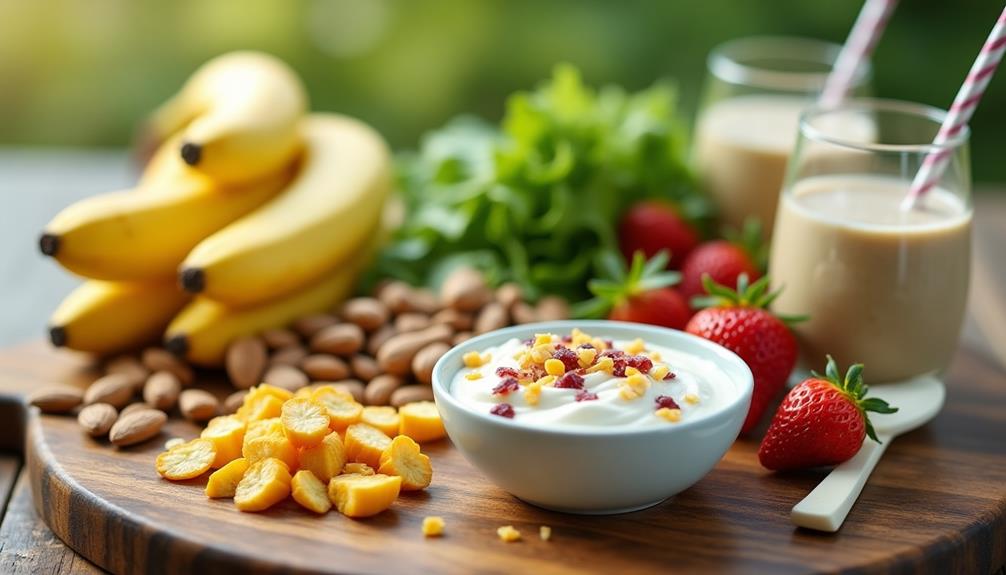To reduce post-workout fatigue, focus on nutrient-dense foods that promote recovery. Start with lean proteins like chicken, fish, or tofu, which help repair muscle tissue. Pair these with complex carbohydrates, such as whole grains and fruits, to replenish your energy. Don't forget healthy fats from sources like avocados and nuts for sustained energy. Hydrating foods like water-rich fruits and vegetables also support recovery. Consider quick options like smoothies that blend protein, fruits, and greens into a convenient drink. Timing your meals within 30-60 minutes post-workout is key, and there's much more to explore on this topic.
Core Insights
- Lean proteins, such as chicken, fish, or tofu, are essential for muscle recovery and reducing fatigue after workouts.
- Complex carbohydrates from whole grains, fruits, and vegetables replenish energy and support glycogen restoration post-exercise.
- Healthy fats sourced from avocados, nuts, and seeds provide sustained energy and help stabilize overall recovery.
- Hydrating foods, including water-rich fruits and vegetables, aid in replenishing lost fluids and electrolytes.
- Nutrient-dense options like leafy greens and berries enhance overall recovery and combat fatigue effectively.
The Importance of Recovery Foods
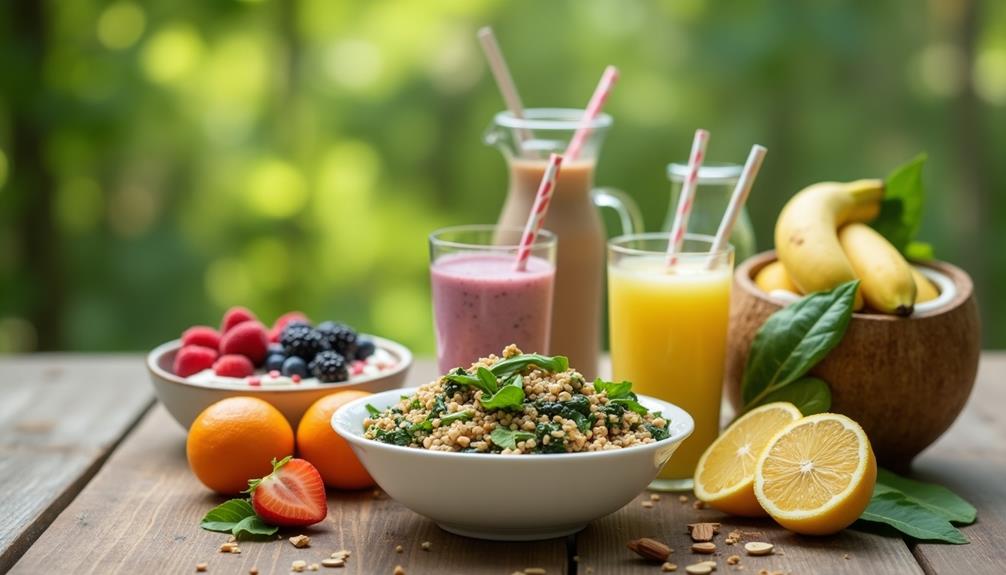
After an intense workout, your body craves the appropriate nutrients to bounce back effectively. Recovery foods play a pivotal role in replenishing energy levels and repairing muscle tissue. They provide essential carbohydrates and proteins that help restore glycogen stores and support muscle recovery. For those looking to build lean muscle mass, lean mass gainers can be an excellent addition to your post-workout nutrition plan. Incorporating foods like lean meats, fish, legumes, and whole grains can greatly enhance your recovery process. Additionally, fruits and vegetables supply essential vitamins and minerals that aid in reducing inflammation. Don't forget healthy fats, too; they contribute to overall recovery. By prioritizing these foods post-workout, you're not just refueling your body—you're also setting yourself up for better performance in future workouts. Remember, recovery isn't just about resting; it's about nourishing your body properly.
Hydration and Electrolyte Balance

Proper hydration and maintaining electrolyte balance are fundamental components of post-workout recovery. When you exercise, you lose fluids and electrolytes like sodium, potassium, and magnesium through sweat. Replenishing these is essential to avoid fatigue and muscle cramps. For peak performance and recovery, consider using hydration powders that are specifically formulated to replenish lost electrolytes and support muscle function.
Begin by drinking water immediately after your workout to rehydrate. For more intense sessions, consider sports drinks that contain electrolytes, as they can help restore lost minerals. Coconut water is another exceptional option, offering natural electrolytes without added sugars.
Listen to your body; if you feel thirsty, it's a sign you need fluids. Additionally, incorporating hydrating foods, like fruits and vegetables, can also aid in recovery. By focusing on hydration and electrolyte balance, you'll feel more energized and ready for your next workout.
Lean Proteins for Muscle Repair
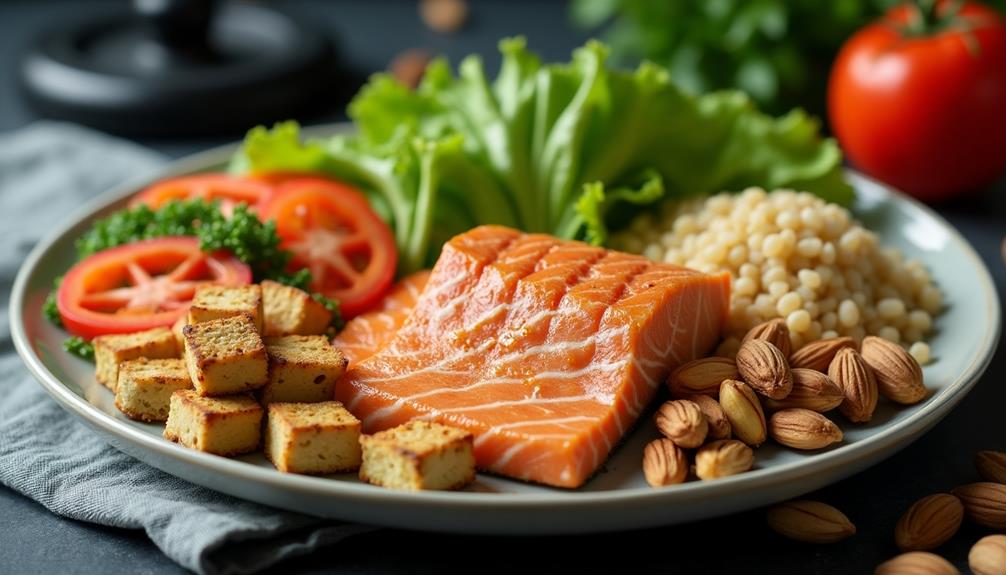
Replenishing your body with lean proteins right after a workout is crucial for muscle repair and recovery. These proteins help rebuild muscle fibers that break down during exercise. Incorporating lean protein into your post-workout meal guarantees your muscles receive the amino acids they need. Grass-fed whey protein is an outstanding option for those seeking a high-quality protein source that's easily digestible and rapidly absorbed by the body. It's particularly effective for post-workout recovery due to its complete amino acid profile.
Outstanding sources of lean protein you can enjoy:
- Grilled chicken breast: A traditional choice, low in fat and high in protein.
- Turkey: A lean substitute that's loaded with nutrients.
- Fish: Choices like salmon or tuna provide omega-3s alongside protein.
- Greek yogurt: A creamy, delightful source that also offers probiotics.
- Legumes: Beans and lentils are plant-based options rich in fiber and protein.
Incorporating these in your diet will assist in your recovery process.
Complex Carbohydrates for Energy
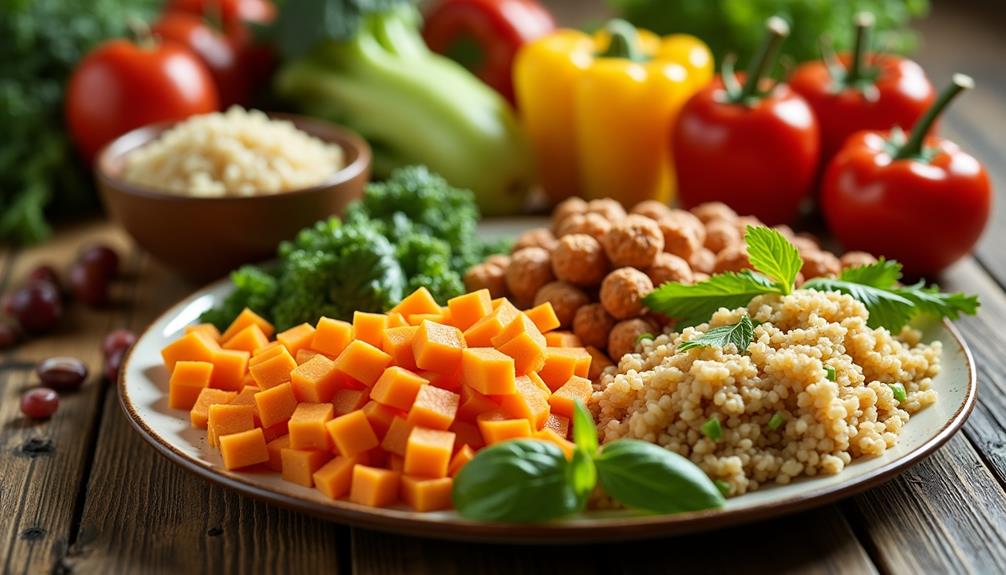
To power up your post-workout recovery, incorporating complex carbohydrates is vital. These carbs provide a steady release of energy, which helps replenish glycogen stores in your muscles. When you engage in intense workouts, your body depletes these stores, making it essential to refuel afterward.
Foods rich in complex carbohydrates include whole grains, legumes, and starchy vegetables. For instance, consider brown rice, quinoa, or sweet potatoes as excellent options. Pairing these with your lean protein can enhance recovery even further.
Aim to consume these carbohydrates within 30 to 60 minutes post-exercise. This timing maximizes glycogen replenishment and minimizes fatigue, setting you up for your next workout. Remember, maintaining energy levels is key to your overall performance and recovery.
Healthy Fats for Sustained Energy
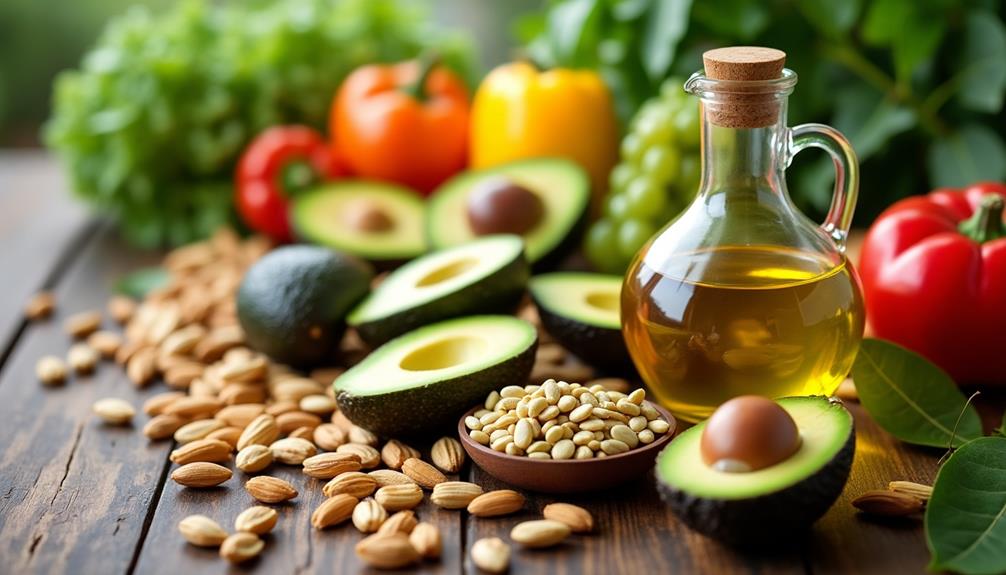
In addition to complex carbohydrates, healthy fats play a significant role in providing sustained energy for your post-workout recovery. Including the right fats in your diet can help you feel more energized and less fatigued. They digest slowly, giving you lasting fuel for your muscles.
Here are five healthy fat sources to contemplate:
- Avocados: Packed with monounsaturated fats and fiber.
- Nuts: Almonds, walnuts, and pistachios offer protein and healthy oils.
- Seeds: Chia, flaxseeds, and pumpkin seeds are great for omega-3s.
- Olive Oil: A heart-healthy option for cooking or drizzling.
- Fatty Fish: Salmon and mackerel provide good fats and protein.
Incorporating these foods can enhance your recovery and keep your energy levels stable.
Fruits for Natural Sugars

While you might reach for energy bars or sports drinks after a workout, fruits can be an excellent source of natural sugars that help replenish your glycogen stores. They not only provide quick energy but also offer essential vitamins and minerals. Here's a quick look at some fruits that can enhance your recovery:
| Fruit | Natural Sugar Content (grams per 100g) |
|---|---|
| Banana | 12.2 |
| Apple | 10.4 |
| Grapes | 16.3 |
| Pineapple | 9.9 |
| Mango | 14.0 |
Incorporating these fruits into your post-workout routine can effectively combat fatigue and keep you feeling revitalized. They're easy to grab, delicious, and packed with nutrients.
Vegetables for Nutrient Boost

After enjoying some fruits for a quick energy boost, consider adding vegetables to your post-workout recovery. They're packed with essential nutrients that help replenish what you've lost during exercise. Vegetables can provide vitamins, minerals, and antioxidants, which play a key role in reducing fatigue and promoting overall recovery.
Here are some great options to include:
- Spinach: Loaded with iron and magnesium, it helps oxygenate your muscles.
- Kale: A powerhouse of vitamins C and K, it supports immune function.
- Carrots: Rich in beta-carotene, they aid in recovery and vision.
- Sweet Potatoes: A fantastic source of complex carbs and potassium, perfect for replenishing energy.
- Broccoli: High in fiber and antioxidants, it supports digestion and inflammation reduction.
Incorporating these veggies can boost your recovery process effectively.
Smoothies for Quick Recovery
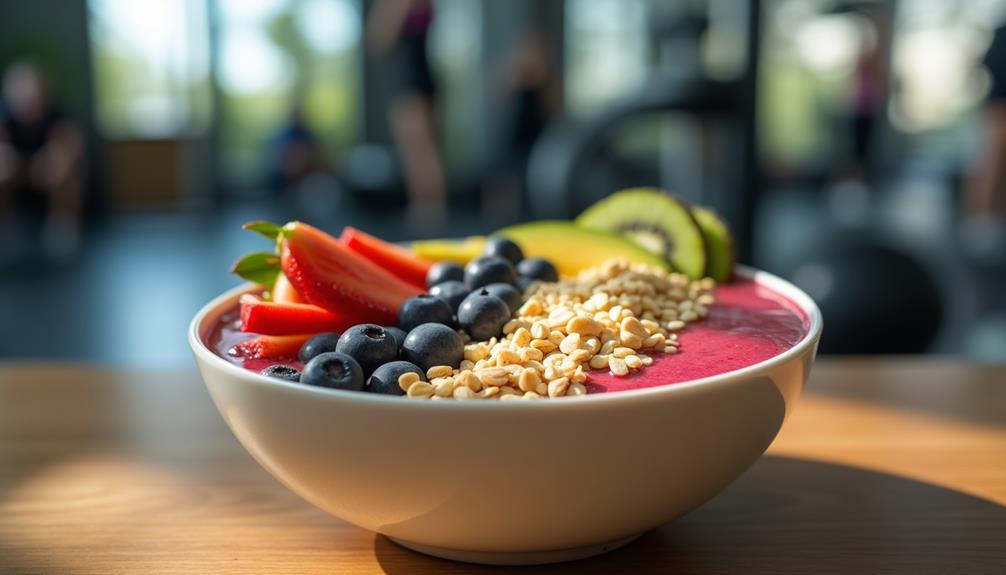
Smoothies can be a game-changer for quick recovery after a workout. They're packed with essential nutrients that help replenish your energy and repair muscles. To make an effective recovery smoothie, start with a base like yogurt or almond milk. This adds protein and calcium, essential for muscle repair.
Next, include fruits like bananas or berries. They provide carbohydrates to restore glycogen levels and antioxidants to reduce inflammation. Don't forget to add a handful of spinach or kale for extra vitamins and minerals.
For an extra boost, consider adding a scoop of protein powder or nut butter. These ingredients enhance the smoothie's protein content, supporting muscle recovery. Blend everything until smooth, and enjoy your tasty, nutrient-rich drink!
Timing Your Post-Workout Meal

Eating the right foods is only part of the recovery puzzle; timing your post-workout meal plays a significant role in how effectively your body recovers. Ideally, you should aim to eat within 30 to 60 minutes after your workout. This is when your muscles are primed to absorb nutrients, helping to replenish glycogen stores and kickstart muscle repair.
Consider these key factors for your post-workout meal:
- Protein: Essential for muscle recovery and growth.
- Carbohydrates: Helps restore energy levels.
- Healthy Fats: Supports overall health and hormone balance.
- Hydration: Replenishes fluids lost during exercise.
- Nutrient Variety: Guarantees a well-rounded intake of vitamins and minerals.
Frequently Asked Questions
Can I Eat Junk Food After a Workout?
Imagine your body as a car; after a race, would you fuel it with low-grade gas? You can eat junk food after a workout, but it won't help you perform at your best later.
How Soon After Exercise Should I Eat?
You should eat within 30 to 60 minutes after exercising. This timeframe helps replenish your energy stores and kickstarts muscle recovery. Don't wait too long; your body needs nutrients to recover effectively.
Are There Specific Foods to Avoid Post-Workout?
After a workout, you should avoid sugary snacks, fried foods, and excessive caffeine. These can lead to energy crashes, hinder recovery, and delay muscle repair. Focus on nutrient-dense options instead for better post-exercise outcomes.
Is It Better to Snack or Have a Full Meal?
Isn't it tempting to grab a quick snack? While a snack can satisfy immediate hunger, a full meal provides balanced nutrition, helping you recover better. It's your choice, but consider what fuels you best.
Can Supplements Replace Whole Foods After Exercising?
Supplements can't fully replace whole foods after exercising. Whole foods provide essential nutrients and energy your body craves. While supplements may help, focus on balanced meals to optimize recovery and nourish your body effectively.

